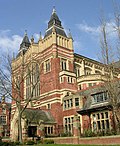Biography and career
West began her career in academic publishing,working as an editor for the Grove Dictionary of Art . She then transitioned to her first academic appointment at the University of Leicester,where she began to focus her research on portraiture and visual culture within European contexts. Her early scholarly contributions laid the foundation for her ongoing research interests in the relationship between art and social identity. [1]
In 1996,West moved to the University of Birmingham to serve as Head of the Department of History of Art. [3] [4] During this period,she conducted research that would eventually be published in works such as Fin de Siècle:Art and Society in an Age of Uncertainty,a book that examined the cultural anxieties and artistic innovations of the late 19th and early 20th centuries. [1] This work,along with her other publications,explored themes of societal change and the role of the visual arts in shaping cultural narratives. [1] In 2000,West’s academic contributions were recognized with a personal chair at Birmingham,elevating her to the rank of full professor. Subsequently,she expanded her responsibilities to include Head of the School of Historical Studies and,briefly,Acting Head of the College of Arts and Law. [1]
In 2008,West was appointed Director of Research at the Arts and Humanities Research Council (AHRC),where she chaired the Research Directors Group for Research Councils UK. [1] In this capacity,she directed efforts to foster interdisciplinary and collaborative research within the arts and humanities. Her role at AHRC marked a shift in her career toward research management and policy development,although she continued her own scholarship in art history,focusing on themes such as German art and cultural identity. Her book The Visual Arts in Germany 1897-1940:Utopia and Despair was published during this time,analyzing how visual arts in Germany reflected the sociopolitical climate leading up to World War II. [1]
In 2011,West joined the University of Oxford as Head of the Humanities Division. [4] Here,she oversaw initiatives such as the Oxford Research Centre in the Humanities (TORCH),an interdisciplinary platform for collaborative research,and the Ertegun Graduate Scholarship Programme in the Humanities,which provided support for humanities graduate students. During her tenure,she researched portraiture,which culminated in the publication of Portraiture,an examination of the history and cultural significance of portraiture as a genre. [1]
In 2015,West became Provost and Deputy Vice-Chancellor at the University of Sheffield. [3] In this role,she managed academic strategy and oversaw the university’s research and educational missions. Her leadership at Sheffield involved significant responsibilities in institutional governance,but she continued to support humanities research through her advisory roles and contributions to scholarly evaluations. [4] [1]
On October 2,2017,West was appointed Vice-Chancellor and President of the University of Nottingham,becoming the seventh individual to hold this position. Shortly after assuming office,she published a new University Strategy in December 2019,which emphasized the university’s priorities for research excellence,education,and community outreach. In this role,she represents the institution on the Universities UK Board. [1] West was appointed Commander of the Order of the British Empire (CBE) in the 2021 New Year Honours for services to education. [5]
In November 2024,West assumed the position of Vice-Chancellor at the University of Leeds,succeeding Simone Buitendijk and acting Vice-Chancellor Hai-Sui Yu. [6] [7]
This page is based on this
Wikipedia article Text is available under the
CC BY-SA 4.0 license; additional terms may apply.
Images, videos and audio are available under their respective licenses.
